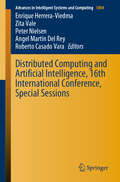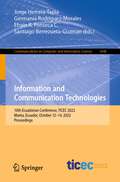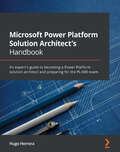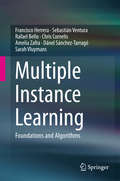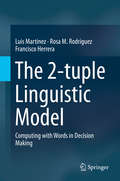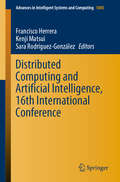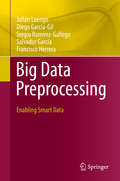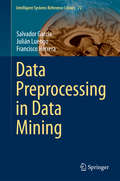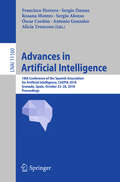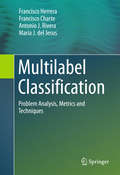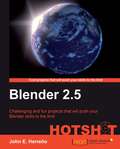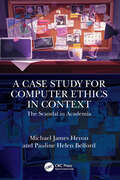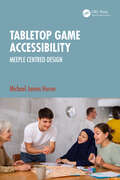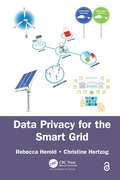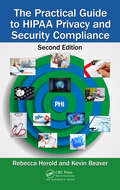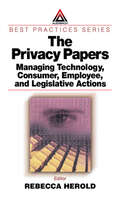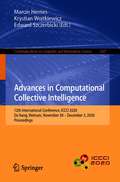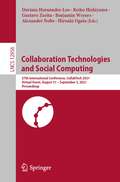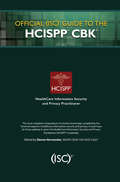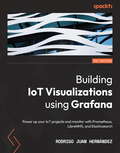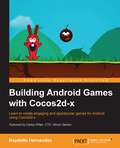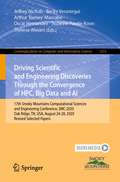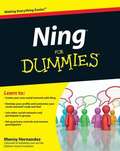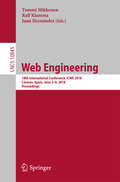- Table View
- List View
Distributed Computing and Artificial Intelligence, 16th International Conference, Special Sessions (Advances in Intelligent Systems and Computing #1004)
by Enrique Herrera-Viedma Zita Vale Peter Nielsen Angel Martin Del Rey Roberto Casado VaraThis book presents the outcomes of the special sessions of the 16th International Conference on Distributed Computing and Artificial Intelligence 2019, a forum that brought together ideas, projects and lessons associated with distributed computing and artificial intelligence, and their applications in various areas. Artificial intelligence is currently transforming our society. Its application in distributed environments, such as the internet, electronic commerce, environmental monitoring, mobile communications, wireless devices, and distributed computing, to name but a few, is continuously increasing, making it an element of high added value and tremendous potential. These technologies are changing constantly as a result of the extensive research and technical efforts being pursued at universities and businesses alike. The exchange of ideas between scientists and technicians from both the academic and industrial sectors is essential to facilitating the development of systems that can meet the ever-growing demands of today’s society. This year’s technical program was characterized by high quality and diversity, with contributions in both well-established and evolving areas of research. More than 120 papers were submitted to the main and special sessions tracks from over 20 different countries (Algeria, Angola, Austria, Brazil, Colombia, France, Germany, India, Italy, Japan, the Netherlands, Oman, Poland, Portugal, South Korea, Spain, Thailand, Tunisia, the United Kingdom and United States), representing a truly “wide area network” of research activity. The symposium was jointly organized by the Osaka Institute of Technology and the University of Salamanca. This year’s event was held in Avila, Spain, from 26th to 28th June, 2019. The authors wish to thank the sponsors: the IEEE Systems Man and Cybernetics Society, Spain Section Chapter and the IEEE Spain Section (Technical Co-Sponsor), IBM, Indra, Viewnext, Global Exchange, AEPIA, APPIA and AIR institute.
Information and Communication Technologies: 10th Ecuadorian Conference, TICEC 2022, Manta, Ecuador, October 12–14, 2022, Proceedings (Communications in Computer and Information Science #1648)
by Jorge Herrera-Tapia Germania Rodriguez-Morales Efraín R. Fonseca C. Santiago Berrezueta-GuzmanThis book constitutes refereed proceedings of the 10th Ecuadorian Conference on Information and Communication Technologies, TICEC 2022, held in Manta, Ecuador, in October 2022.The 20 full papers were carefully reviewed and selected from 150 qualified submissions. The papers cover a great variety of topics, such as wireless communication, immersive environments, artificial intelligence, data mining, neural networks, augmented reality, cyberphysical systems, telemedicine, cybersecurity, software architecture, data processing, software development, and others. The contributions are divided into the following thematic blocks: ICT´s Applications; Data Science; Software Development.
Microsoft Power Platform Solution Architect's Handbook: An expert's guide to becoming a Power Platform solution architect and preparing for the PL-600 exam
by Hugo Herrera Greg MaderGain expertise in solution architecture and master all aspects of Power Platform, from data and automation to analytics and securityKey FeaturesBecome a full-fledged Power Platform expert and lead your solutions with conviction and clarityAdopt a consistent, systematic, and advanced approach to solution architectureWork on practical examples and exercises to develop expert-level skills and prepare for certificationBook DescriptionIf you've been looking for a way to unlock the potential of Microsoft Power Platform and take your career as a solution architect to the next level, then look no further—this practical guide covers it all.Microsoft Power Platform Solution Architect's Handbook will equip you with everything you need to build flexible and cost-effective end-to-end solutions. Its comprehensive coverage ranges from best practices surrounding fit-gap analysis, leading design processes, and navigating existing systems to application lifecycle management with Microsoft Azure DevOps, security compliance monitoring, and third-party API integration.The book takes a hands-on approach by guiding you through a fictional case study throughout the book, allowing you to apply what you learn as you learn it. At the end of the handbook, you'll discover a set of mock tests for you to embed your progress and prepare for PL-600 Microsoft certification.Whether you want to learn how to work with Power Platform or want to take your skills from the intermediate to advanced level, this book will help you achieve that and ensure that you're able to add value to your organization as an expert solution architect.What you will learnCement the foundations of your applications using best practicesUse proven design, build, and go-live strategies to ensure successLead requirements gathering and analysis with confidenceSecure even the most complex solutions and integrationsEnsure compliance between the Microsoft ecosystem and your businessBuild resilient test and deployment strategies to optimize solutionsWho this book is forThis book is for solution architects, enterprise architects, technical consultants, and business and system analysts who implement, optimize, and architect Power Platform and Dataverse solutions. It will also help anyone who needs a detailed playbook for architecting and delivering successful digital transformation projects that leverage Power Platform apps and the Microsoft business apps ecosystem. A solid understanding of Power Platform configuration and administration, Power Automate processes, Power Apps Portals, Canvas Apps, Dataverse Plugins, and Workflow Capabilities is expected.
Multiple Instance Learning
by Francisco Herrera Sebastián Ventura Rafael Bello Chris Cornelis Amelia Zafra Dánel Sánchez-Tarragó Sarah VluymansThis book provides a general overview of multiple instance learning (MIL), defining the framework and covering the central paradigms. The authors discuss the most important algorithms for MIL such as classification, regression and clustering. With a focus on classification, a taxonomy is set and the most relevant proposals are specified. Efficient algorithms are developed to discover relevant information when working with uncertainty. Key representative applications are included. This book carries out a study of the key related fields of distance metrics and alternative hypothesis. Chapters examine new and developing aspects of MIL such as data reduction for multi-instance problems and imbalanced MIL data. Class imbalance for multi-instance problems is defined at the bag level, a type of representation that utilizes ambiguity due to the fact that bag labels are available, but the labels of the individual instances are not defined. Additionally, multiple instance multiple label learning is explored. This learning framework introduces flexibility and ambiguity in the object representation providing a natural formulation for representing complicated objects. Thus, an object is represented by a bag of instances and is allowed to have associated multiple class labels simultaneously. This book is suitable for developers and engineers working to apply MIL techniques to solve a variety of real-world problems. It is also useful for researchers or students seeking a thorough overview of MIL literature, methods, and tools.
The 2-tuple Linguistic Model
by Francisco Herrera Rosa M. Rodriguez Luis MartínezThis book examines one of the more common and wide-spread methodologies to deal with uncertainty in real-world decision making problems, the computing with words paradigm, and the fuzzy linguistic approach. The 2-tuple linguistic model is the most popular methodology for computing with words (CWW), because it improves the accuracy of the linguistic computations and keeps the interpretability of the results. The authors provide a thorough review of the specialized literature in CWW and highlight the rapid growth and applicability of the 2-tuple linguistic model. They explore the foundations and methodologies for CWW in complex frameworks and extensions. The book introduces the software FLINTSTONES that provides tools for solving linguistic decision problems based on the 2-tuple linguistic model. Professionals and researchers working in the field of classification or fuzzy sets and systems will find The 2-tuple Linguistic Model: Computing with Words in Decision Making a valuable resource. Undergraduate and postdoctoral students studying computer science and statistics will also find this book a useful study guide.
Distributed Computing and Artificial Intelligence, 16th International Conference (Advances in Intelligent Systems and Computing #1003)
by Francisco Herrera Kenji Matsui Sara Rodríguez-GonzálezThis book features the outcomes of the 16th International Conference on Distributed Computing and Artificial Intelligence 2019 (DCAI 2019), which is a forum to present applications of innovative techniques for studying and solving complex problems in artificial intelligence and computing. The exchange of ideas between scientists and technicians from both the academic and industrial sectors is essential to facilitate the development of systems that can meet the ever-increasing demands of today’s society. This book brings together lessons learned, current work and promising future trends associated with distributed computing, artificial intelligence and their application to provide efficient solutions to real-world problems.The book includes 29 high-quality and diverse contributions in established and emerging areas of research presented at the symposium organized by the Osaka Institute of Technology, Hiroshima University, University of Granada and University of Salamanca, which was held in Ávila, Spain, from 26th–28th June 2019
Big Data Preprocessing: Enabling Smart Data
by Francisco Herrera Salvador García Julián Luengo Diego García-Gil Sergio Ramírez-GallegoThis book offers a comprehensible overview of Big Data Preprocessing, which includes a formal description of each problem. It also focuses on the most relevant proposed solutions. This book illustrates actual implementations of algorithms that helps the reader deal with these problems. This book stresses the gap that exists between big, raw data and the requirements of quality data that businesses are demanding. This is called Smart Data, and to achieve Smart Data the preprocessing is a key step, where the imperfections, integration tasks and other processes are carried out to eliminate superfluous information. The authors present the concept of Smart Data through data preprocessing in Big Data scenarios and connect it with the emerging paradigms of IoT and edge computing, where the end points generate Smart Data without completely relying on the cloud.Finally, this book provides some novel areas of study that are gathering a deeper attention on the Big Data preprocessing. Specifically, it considers the relation with Deep Learning (as of a technique that also relies in large volumes of data), the difficulty of finding the appropriate selection and concatenation of preprocessing techniques applied and some other open problems.Practitioners and data scientists who work in this field, and want to introduce themselves to preprocessing in large data volume scenarios will want to purchase this book. Researchers that work in this field, who want to know which algorithms are currently implemented to help their investigations, may also be interested in this book.
Data Preprocessing in Data Mining (Intelligent Systems Reference Library #72)
by Francisco Herrera Salvador García Julián LuengoData Preprocessing for Data Mining addresses one of the most important issues within the well-known Knowledge Discovery from Data process. Data directly taken from the source will likely have inconsistencies, errors or most importantly, it is not ready to be considered for a data mining process. Furthermore, the increasing amount of data in recent science, industry and business applications, calls to the requirement of more complex tools to analyze it. Thanks to data preprocessing, it is possible to convert the impossible into possible, adapting the data to fulfill the input demands of each data mining algorithm. Data preprocessing includes the data reduction techniques, which aim at reducing the complexity of the data, detecting or removing irrelevant and noisy elements from the data. This book is intended to review the tasks that fill the gap between the data acquisition from the source and the data mining process. A comprehensive look from a practical point of view, including basic concepts and surveying the techniques proposed in the specialized literature, is given. Each chapter is a stand-alone guide to a particular data preprocessing topic, from basic concepts and detailed descriptions of classical algorithms, to an incursion of an exhaustive catalog of recent developments. The in-depth technical descriptions make this book suitable for technical professionals, researchers, senior undergraduate and graduate students in data science, computer science and engineering.
Advances in Artificial Intelligence: 18th Conference of the Spanish Association for Artificial Intelligence, CAEPIA 2018, Granada, Spain, October 23–26, 2018, Proceedings (Lecture Notes in Computer Science #11160)
by Francisco Herrera Sergio Damas Rosana Montes Sergio Alonso Óscar Cordón Antonio González Alicia TroncosoThis book constitutes the refereed proceedings of the 18th Conference of the Spanish Association for Artificial Intelligence, CAEPIA 2018, held in Granada, Spain, in October 2018.The 36 full papers presented were carefully selected from 240 submissions. The Conference of the Spanish Association of Artificial Intelligence (CAEPIA) is a biennial forum open to researchers from all over the world to present and discuss their latest scientific and technological advances in Antificial Intelligence (AI). Authors are kindly requested to submit unpublished original papers describing relevant research on AI issues from all points of view: formal, methodological, technical or applied.
Multilabel Classification
by Francisco Herrera Francisco Charte Antonio J. Rivera María J. JesusThis book offers a comprehensive review of multilabel techniques widely used to classify and label texts, pictures, videos and music in the Internet. A deep review of the specialized literature on the field includes the available software needed to work with this kind of data. It provides the user with the software tools needed to deal with multilabel data, as well as step by step instruction on how to use them. The main topics covered are: * The special characteristics of multi-labeled data and the metrics available to measure them. * The importance of taking advantage of label correlations to improve the results. * The different approaches followed to face multi-label classification. * The preprocessing techniques applicable to multi-label datasets. * The available software tools to work with multi-label data. This book is beneficial for professionals and researchers in a variety of fields because of the wide range of potential applications for multilabel classification. Besides its multiple applications to classify different types of online information, it is also useful in many other areas, such as genomics and biology. No previous knowledge about the subject is required. The book introduces all the needed concepts to understand multilabel data characterization, treatment and evaluation.
Blender 2.5 HOTSHOT
by John E. HerreñoUsing a projects based approach you will learn fun and challenging aspects of Blender 3D development. With each project you will be able to show off a creation that utilizes Blender 3D maximum potential.If you are already able to perform some basic tasks with Blender 3D and want to go from the simple and boring renders of monkey-headed characters living in box-like scenes to creating more detailed, visually richer, and more polished results then this book is for you. It will give you a good idea of the amount of complexity required for real-world projects and help you in deciding what area you are going to specialize in later on.This book is also useful if you are a user of any other 3D package wanting to get up and running fast with Blender 3D.
A Case Study for Computer Ethics in Context: The Scandal in Academia
by Michael James Heron Pauline Helen BelfordAimed at addressing the difficulties associated with teaching often abstract elements of technical ethics, this book is an extended fictional case study into the complexities of technology and social structures in complex organizations. Within this case study, an accidental discovery reveals that the algorithms of Professor John Blackbriar are not quite what they were purported to be. Over the course of 14 newspaper articles, a nebula of professional malpractice and ethical compromise is revealed, ultimately destroying the career of a prominent, successful academic.The case study touches on many topics relevant to ethics and professional conduct in computer science, and on the social structures within which computer science functions. Themes range from the growing influence of generative AI to the difficulties in explaining complex technical processes to a general audience, also touching on the environmental consequences of blockchain technology and the disproportionate gender impacts of Coronavirus. Each new revelation in the case study unveils further layers of complexity and compromise, leading to new technical and social issues that need to be addressed.Directly aimed at making ethics in the digital age accessible through the use of real-world examples, this book appeals to computer science students at all levels of the educational system, as well as making an excellent accompaniment to lecturers and course convenors alike.
Tabletop Game Accessibility: Meeple Centred Design
by Michael James HeronThis foundational resource on the topic of tabletop game accessibility provides actionable guidelines on how to make games accessible for people with disabilities. This book contextualises this practical guidance within a philosophical framework of how the relatively abled can ethically address accessibility issues within game design.This book helps readers to build understanding and empathy across the various categories of accessibility. Chapters on each category introduce ‘the science’, outline the game mechanics and games that show exemplar problems, relate these to the real-world situations that every player may encounter, and then discuss how to create maximally accessible games with reference to the accessibility guidelines and specific games that show ‘best-in-class’ examples of solutions.This book will be of great interest to all professional tabletop and board game designers as well as digital game designers and designers of other physical products.
Data Privacy for the Smart Grid
by Rebecca Herold Christine HertzogPrivacy for the Smart Grid provides easy-to-understand guidance on data privacy issues and the implications for creating privacy risk management programs, along with privacy policies and practices required to ensure Smart Grid privacy. It addresses privacy in electric, natural gas, and water grids from two different perspectives of the topic, one from a Smart Grid expert and another from a privacy and information security expert. While considering privacy in the Smart Grid, the book also examines the data created by Smart Grid technologies and machine-to-machine applications.
The Practical Guide to HIPAA Privacy and Security Compliance
by Rebecca Herold Kevin BeaverFollowing in the footsteps of its bestselling predecessor, The Practical Guide to HIPAA Privacy and Security Compliance, Second Edition is a one-stop, up-to-date resource on Health Insurance Portability and Accountability Act (HIPAA) privacy and security, including details on the HITECH Act, the 2013 Omnibus Rule, and the pending rules. Updated and
The Privacy Papers: Managing Technology, Consumer, Employee and Legislative Actions (ISSN)
by Rebecca HeroldToday, more than ever, organizations have to cope with increased concerns regarding privacy issues. These concerns are not limited to consumer fears about how information collected by Web sites will be used or misused. They also involve broader issues, including data collected for direct response marketing, privacy of financial and health records,
Advances in Computational Collective Intelligence: 12th International Conference, ICCCI 2020, Da Nang, Vietnam, November 30 – December 3, 2020, Proceedings (Communications in Computer and Information Science #1287)
by Marcin Hernes Krystian Wojtkiewicz Edward SzczerbickiThis book constitutes refereed proceedings of the 12th International Conference on International Conference on Computational Collective Intelligence, ICCCI 2020, held in Da Nang, Vietnam, in November – December 2020. Due to the the COVID-19 pandemic the conference was held online. The 68 papers were thoroughly reviewed and selected from 314 submissions. The papers are organized according to the following topical sections: data mining and machine learning; deep learning and applications for industry 4.0; recommender systems; computer vision techniques; decision support and control systems; intelligent management information systems; innovations in intelligent systems; intelligent modeling and simulation approaches for games and real world systems; experience enhanced intelligence to IoT; data driven IoT for smart society; applications of collective intelligence; natural language processing; low resource languages processing; computational collective intelligence and natural language processing.
The Measure of All Minds
by José Hernández-OralloAre psychometric tests valid for a new reality of artificial intelligence systems, technology-enhanced humans, and hybrids yet to come? Are the Turing Test, the ubiquitous CAPTCHAs, and the various animal cognition tests the best alternatives? In this fascinating and provocative book, José Hernández-Orallo formulates major scientific questions, integrates the most significant research developments, and offers a vision of the universal evaluation of cognition. By replacing the dominant anthropocentric stance with a universal perspective where living organisms are considered as a special case, long-standing questions in the evaluation of behavior can be addressed in a wider landscape. Can we derive task difficulty intrinsically? Is a universal g factor - a common general component for all abilities - theoretically possible? Using algorithmic information theory as a foundation, the book elaborates on the evaluation of perceptual, developmental, social, verbal and collective features and critically analyzes what the future of intelligence might look like. Provides a universal framework integrating the evaluation of development, social and communication skills, and collective intelligence Compares the behavior evaluation of humans, non-human animals, and computers Blends cutting-edge theory and technology with historical context
Collaboration Technologies and Social Computing: 27th International Conference, CollabTech 2021, Virtual Event, August 31 – September 3, 2021, Proceedings (Lecture Notes in Computer Science #12856)
by Davinia Hernández-Leo Reiko Hishiyama Gustavo Zurita Benjamin Weyers Alexander Nolte Hiroaki OgataThis volume constitutes the proceedings of the 27th International Conference on Collaboration Technologies and Social Computing, CollabTech 2021, held August/September 2021. Due to VOVID-19 pandemic is was held virtually. The 5 full and 4 work-in-process papers presented in this volume were carefully reviewed and selected from 19 submissions. The papers focus on innovative technical, human and organizational approaches to expand collaboration support including computer science, management science, design science, cognitive and social science.
Official ((ISC)2 Press)
by Steven HernandezHealthCare Information Security and Privacy Practitioners (HCISPPSM) are the frontline defense for protecting patient information. These are the practitioners whose foundational knowledge and experience unite healthcare information security and privacy best practices and techniques under one credential to protect organizations and sensitive patient data against emerging threats and breaches. The Official (ISC)2 (R) Guide to the HCISPPSM CBK (R) is a comprehensive resource that provides an in-depth look at the six domains of the HCISPP Common Body of Knowledge (CBK). This guide covers the diversity of the healthcare industry, the types of technologies and information flows that require various levels of protection, and the exchange of healthcare information within the industry, including relevant regulatory, compliance, and legal requirements. Numerous illustrated examples and tables are included that illustrate key concepts, frameworks, and real-life scenarios. Endorsed by the (ISC)(2) and compiled and reviewed by HCISPPs and (ISC)(2) members, this book brings together a global and thorough perspective on healthcare information security and privacy. Utilize this book as your fundamental study tool in preparation for the HCISPP certification exam.
Building IoT Visualizations using Grafana: Power up your IoT projects and monitor with Prometheus, LibreNMS, and Elasticsearch
by Rodrigo Juan HernandezThe IoT developer's complete guide to building powerful dashboards, analyzing data, and integrating with other platformsKey FeaturesConnect devices, store and manage data, and build powerful data visualizationsIntegrate Grafana with other systems, such as Prometheus, OpenSearch, and LibreNMSLearn about message brokers and data forwarders to send data from sensors and systems to different platformsBook DescriptionGrafana is a powerful open source software that helps you to visualize and analyze data gathered from various sources. It allows you to share valuable information through unclouded dashboards, run analytics, and send notifications. Building IoT Visualizations Using Grafana offers how-to procedures, useful resources, and advice that will help you to implement IoT solutions with confidence. You'll begin by installing and configuring Grafana according to your needs. Next, you'll acquire the skills needed to implement your own IoT system using communication brokers, databases, and metric management systems, as well as integrate everything with Grafana. You'll learn to collect data from IoT devices and store it in databases, as well as discover how to connect databases to Grafana, make queries, and build insightful dashboards. Finally, the book will help you implement analytics for visualizing data, performing automation, and delivering notifications. By the end of this Grafana book, you'll be able to build insightful dashboards, perform analytics, and deliver notifications that apply to IoT and IT systems.What you will learnInstall and configure Grafana in different types of environmentsEnable communication between your IoT devices using different protocolsBuild data sources by ingesting data from IoT devicesGather data from Grafana using different types of data sourcesBuild actionable insights using plugins and analyticsDeliver notifications across several communication channelsIntegrate Grafana with other platformsWho this book is forThis book is for IoT developers who want to build powerful visualizations and analytics for their projects and products. Technicians from the embedded world looking to learn how to build systems and platforms using open source software will also benefit from this book. If you have an interest in technology, IoT, open source, and related subjects then this book is for you. Basic knowledge of administration tasks on Linux-based systems, IP networks and network services, protocols, ports, and related topics will help you make the most out of this book.
Building Android Games with Cocos2d-x
by Raydelto HernandezIf you have a basic understanding of the C++ programming language and want to create videogames for the Android platform, then this technology and book is ideal for you.
Driving Scientific and Engineering Discoveries Through the Convergence of HPC, Big Data and AI: 17th Smoky Mountains Computational Sciences and Engineering Conference, SMC 2020, Oak Ridge, TN, USA, August 26-28, 2020, Revised Selected Papers (Communications in Computer and Information Science #1315)
by Oscar Hernandez Jeffrey Nichols Becky Verastegui Arthur ‘Barney’ Maccabe Suzanne Parete-Koon Theresa AhearnThis book constitutes the revised selected papers of the 17th Smoky Mountains Computational Sciences and Engineering Conference, SMC 2020, held in Oak Ridge, TN, USA*, in August 2020.The 36 full papers and 1 short paper presented were carefully reviewed and selected from a total of 94 submissions. The papers are organized in topical sections of computational applications: converged HPC and artificial intelligence; system software: data infrastructure and life cycle; experimental/observational applications: use cases that drive requirements for AI and HPC convergence; deploying computation: on the road to a converged ecosystem; scientific data challenges.*The conference was held virtually due to the COVID-19 pandemic.
Ning For Dummies
by Manny HernandezNing is a cool, free social networking platform, and you can learn how to use Ning quickly and easily with Ning For Dummies. If you have a cause to promote or a passion about a topic, here's how to explore existing networks and interact with others who share your obsession, as well as how to start one of your own.Begin by joining other networks and participating in groups. Then you'll find out how to create your own social network, develop your profile, customize your network's look and feel, set up privacy controls, oversee participation, and manage all the details.Investigate existing networks, see how to join private networks, and manage your profile for privacyAdd photos, videos, and music files to existing networksDiscover the comment wall, rate items from members, moderate comments on your blog, and respond to eventsStart a discussion, invite people to an event, or create a groupSet up your network, decide if it should be public or private, research the competition, and find your nicheChoose a good Web address and learn to monitor traffic with Google AnalyticsGive your main page character with custom widgets and personalized featuresNing is fun, easy, and free. Ning For Dummies shows you how to plan your network so it stands out from the crowd, manage interaction, include multimedia, and more!
Web Engineering: 18th International Conference, Icwe 2018, Cáceres, Spain, June 5-8, 2018, Proceedings (Theoretical Computer Science and General Issues #10845)
by Juan Hernández Ralf Klamma Tommi MikkonenThis book constitutes the refereed proceedings of the 18th International Conference on Web Engineering, ICWE 2018, held in Cáceres, Spain, in June 2018.The 18 full research papers and 17 short papers presented together with 2 practice papers, 6 demonstration papers, and 5 tutorials were carefully reviewed and selected from 103 submissions. The papers cover research areas such as Web application modeling and engineering; Web infrastructures and architectures; execution models; human computation and crowdsourcing applications; Web application composition and mashups; Social Web applications; Semantic Web applications; Web of Things applications; big data and data analytics; and security, privacy, and identity.
